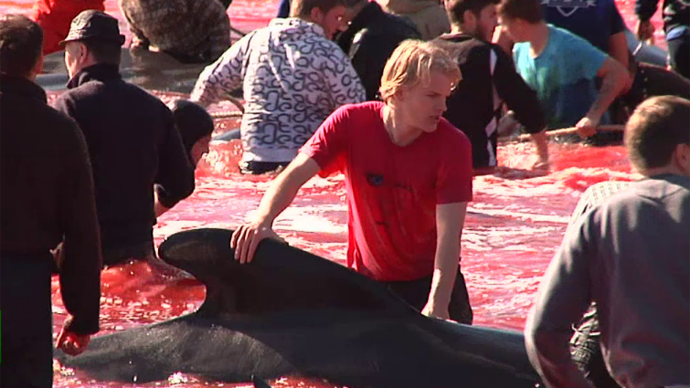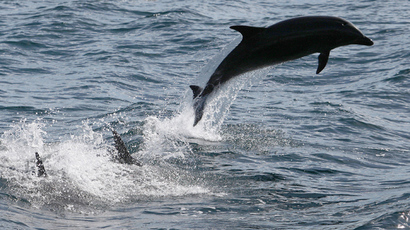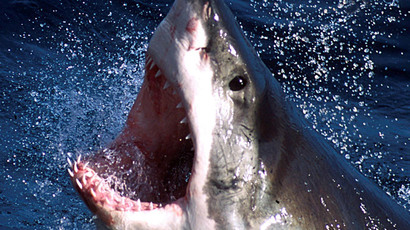Whales butchered in bloody seas: Faroe islanders say it’s tradition, others protest
The waters on the shores of Denmark’s Faroe Islands turn red in summer. The islanders are keen on preserving a centuries-old bloody practice of whale hunting, which turns small bays in slaughterhouses despite the efforts of activists to stop them.
“This is an old tradition, and as you know, there’s some conflict in this, because there are people from outside, from the mainland who don’t like what we’re doing here,” local journalist Finnur Koba told RT.
The Faroe Islands are an autonomous country within the Kingdom of Denmark, about halfway between Norway and Iceland where the Norwegian Sea meets the North Atlantic. For their northerly latitude their climate is relatively mild and barely changes between summer and winter, with a mean summer temperature of 13 degrees Celsius and a winter average of 3 degrees.
Last month six protesters from the Sea Shepherd Conservation Society were found guilty by a Faroe Islands’ court of interfering with the grind, or whale drive hunts.
Sea Shepherd was founded by Paul Watson in the 1980s with the aim of halting the practice of killing whales and uses confrontational tactics such as ramming whaling ships.
During a whale grind a flotilla of small power boats drive the whales or dolphins into a shallow bay where they are slaughtered with knives, in a process which is part of a 1,000 year old tradition.
Although Denmark is an anti-whaling member of the EU and is
subject to laws prohibiting the slaughter of cetaceans – marine
mammals including whales, dolphins and porpoises – it defends the
right of the islanders to practice the grind.
Once the whales are in shallow water, people on the shore cut the
whales’ neck and try and break the spinal cord and although there
is a lot of blood, death occurs quickly.
Although whale hunting was carried out in other European communities, they have either stopped completely or changed their techniques to cut down on the amount of blood shed.
In the Faroes, the islanders still feel a real cultural attachment to the practice and point out that the hunt is primarily for food.
Whale meat can be boiled, broiled as a steak or air dried and can even be eaten raw in thin slices.

“Simply cook it [whale] up with potatoes, which is probably my favorite anyway,” said one islander.
But not everyone in the Faroes is happy with the practice.
A Faroe islander, Ingi Sørensen, who also is an underwater whale photographer believes the practice belongs in the history books.
“It belongs to the past. In those days it gave us life. Without the grind there would be no life here. But today it’s absolutely unnecessary,” he said.
Pitting tradition against modern values is something most Faroe islanders are happy to do, Finnur Koba explained.
“The tradition is very difficult to explain. It’s something that lives deep inside you, its culture you know. It’s what defines who you are,” he said.
However, the long-term yearly average catch of whales is about 800, not enough to dent the large population of pilot whales in the northeast Atlantic, or big enough to make any real difference to the local economy.
There are no professional whale hunters any more on the Faroe Islands and no one relies on it for their living. All whalers have a day job and when the call to the grind goes out on mobile phones, local radio and social media, everyone tries to get the beach in time for the hunt.
One islander explained to the RT crew that he took his daughter to a grind to show her how whales are killed and then cut up for meat. He said he wanted her to understand where food comes from. His daughter was not apparently particularly fazed either way about what she witnessed.
The islanders are adamant that they kill the whales as humanely as possible and they point out that they only hunt pilot whales not the bigger killer whales, which in some areas of the world are a protected species.
If there is anything likely to put a stop to the practice, it’s not protests by animal rights activists but health concerns as increasing amounts of heavy metal toxins are being found in whale meat. Some Faroe islanders, including the head physician of the islands Dr Pál Weihe, are not enthusiastic about eating it.
In 2008 Weihe, alongside the Chief Medical Officer of the
islands, advised against human consumption of pilot whale.
“The amount of toxins found in pilot whales has not
decreased, and we still don´t know much about the long-term
damage caused by biological toxins. This is why we warn that
pilot whale is not fit for human consumption,” Weihe told a
Faroese magazine in September 2013.














